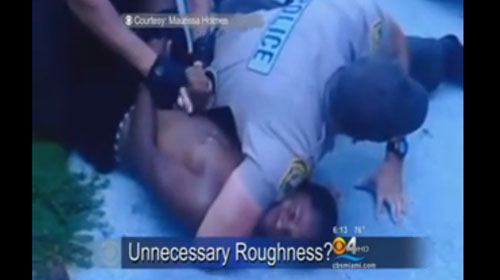
Last week down in Florida, 14-year-old Tremaine McMillian was playing in the water with a friend at the beach when a Miami-Dade police officer approached him to ask what he was doing, misinterpreting their play for a fight. Tremaine walked away from the officers, carrying his new puppy in his arms. After observing his allegedly "dehumanizing stares" and clenched fists, the officer used his ATV to chase Tremaine down and throw him to the ground in a chokehold so intense that the teenager wet himself during the incident. It was his mother who caught part of the incident on camera.
When I was 14, a security guard reprimanded me for leaping back and forth between the different colored tiles on the floor at the mall while I waited for my mom to finish some errands. He seemed to think I was disrupting the peace (if such a thing can be found in a mall); I thought he was a grumpy and mean grownup. I glared back at him and jumped to another tile, then sulked off to find my mom. And that was the end of our interaction. As it should have been.
Tremaine's story, much unlike my own, has yet to end. Outrageously, he is now being charged with a felony for resisting arrest with violence, and a misdemeanor for disorderly conduct. Notably, both alleged offenses apparently occurred after the teen was pursued and tackled by the police officer—which begs the question why he was pursued and tackled in the first place.
But the better question may be why did Tremaine's story end with a violent and traumatic arrest, while I was allowed to go about my business? Both of us were messing around like kids do, and both of us (allegedly) shot a dirty look at an authority figure. But as a white teen, I had my skin color on my side. Tremaine, who is Black, is now one more kid on a growing list of Black and Brown kids and young adults around the country whose actions have been ruthlessly criminalized because of their skin color. (17-year-old Trayvon Martin, 5-year-old Michael Davis, 16-year-old Kiera Wilmot, 7-year-old Wilson Reyes, and 18-year-old Ramarley Graham are just a few that come to mind.) However chilling it may be to some of us, this narrative has become alarmingly commonplace. Indeed, such incidents have become so routine that one recent article focused more attention on the welfare of the puppy than on the young man, with a headline reading "6-week-old pit bull injured by Miami-Dade police in incident near Haulover Beach."
Police detective Alvaro Zabaleta justified his physical response to McMillian, saying "All of that body language alone is already letting the officers know that this is a person that is now obviously getting agitated and can become violent." That's right: Tremaine's body language was enough to constitute a threat to the officer. "Of course we have to neutralize the threat in front of us," Zabaleta went on to say. This interpretation of Tremaine's obviously benign response to the officer is so overtly racist that one would hope the criminal charges against him would be dropped just on principle, but a judge denied his public defender's request to have the charges reconsidered.
For the Miami police, racially charged interactions with Black men are especially common. That this kind of police brutality against kids of color is almost ceasing to shock the public is alarming, and the familiarity of Tremaine's story is haunting. The "threat" posed by this 14-year-old was clearly fabricated as a feeble excuse for the racism that poisons the assumptions and decision-making process of Miami-Dade police officers. There should be no room in the media's discourse for this inane justification for violence against young Black men like Tremaine. Maybe we should start by de-emphasizing the fate of the puppy, and focusing on how best to challenge the senseless brutality visited upon Tremaine and so many other young Black men and women in this country.
Learn more about criminal law reform and other civil liberty issues: Sign up for breaking news alerts, follow us on Twitter, and like us on Facebook.



